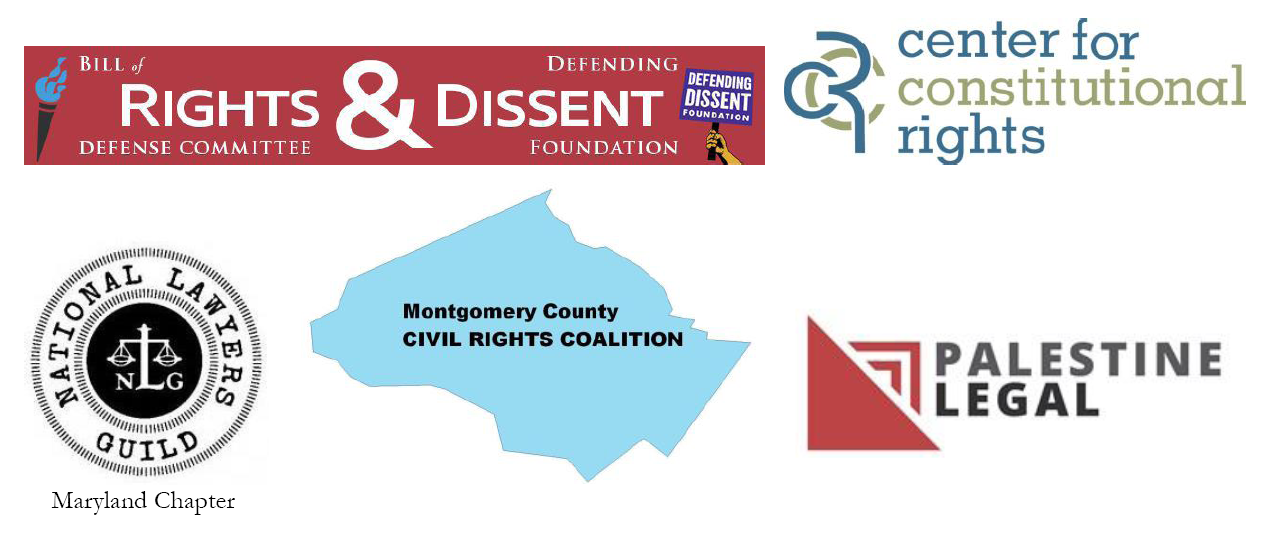On February 22, 2017, CCR, Palestine Legal, the Bill of Rights Defense Committee/Defending Dissent Foundation, the Maryland National Lawyers Guild, and the Montgomery County Civil Rights Coalition sent a memorandum to Maryland lawmakers opposing HB 949 and SB 739, anti-boycott bills that would require Maryland to create a blacklist of "persons" - including individuals and community organizations - that engage in Boycott, Divestment, and Sanctions (BDS) and prohibit the state from investing in those "persons."
In previous efforts, CCR, the Maryland and D.C. chapters of the National Lawyers Guild, and the Defending Dissent Foundation sent Maryland Senators and Delegates a letter on March 3, 2014 urging them to oppose then-pending legislation that would have reduced state funding to colleges and universities that fund membership and activities in organizations supporting boycotts of certain countries, including Israel. According to the legislation’s supporters, Senate Bill 647 and House Bill 998 were drafted in response to the American Studies Association’s 2013 resolution to boycott Israeli academic institutions. CCR and the other groups sent Maryland legislators a letter opposing a similar budget amendment on April 2, 2014.
These letters are part of a continuing effort to challenge bills that threaten core First Amendment-protected activity in support of Palestinian rights, following from the efforts of CCR, Palestine Legal, and other allies to challenge legislation in New York, California, Ohio, Georgia, New Jersey, Pennsylvania, Massachusetts, South Carolina, Texas, Virginia, Illinois, Florida, and the U.S. Congress. These bills are part of a growing trend of introducing legislation intended to silence Palestinian rights advocacy in numerous states and the U.S. Congress. For more information about other efforts to suppress First Amendment-protected activities in support of Palestinian rights, including other legislative efforts to restrict BDS campaign efforts, see CCR and Palestine Legal’s report, The Palestine Exception to Free Speech: A Movement Under Attack in the U.S.
The text of the 2017 memorandum is below.

February 22, 2017
Dear Honorable Member of the Maryland General Assembly,
We are writing to express our opposition to SB739/HB949. This bill is aimed at suppressing First Amendment protected speech by denying public benefits to those who boycott Israel or “Israeli-controlled territories.” In order to accomplish this goal, the bill would task the Board of Trustees for the State Retirement and Pension System with assembling a blacklist of persons engaged in such boycotts. This list is to be based on publicly available information and to be published online. Its definition of “person” explicitly includes “natural persons” and “non government organizations,” meaning that individuals, churches, trade unions, and other civil society groups could wind up on an online blacklist. Such a practice is reminiscent of the worst abuses of the McCarthy Era.
The bill is aimed at the Boycott, Divestment, and Sanctions (BDS) movement, which seeks to use non-violent protest to change Israel’s human rights policies towards the Palestinian people. Regardless of one’s personal opinion of BDS, the First Amendment of the United States Constitution gives all people the right to criticize the policies of both our own government, and that of a foreign government. We recognize that the co-sponsors of SB739/HB949 feel passionately about their opposition to BDS, and that the First Amendment protects those views no less than it protects the views of those who support BDS. The First Amendment, however, prohibits the government from using its power to silence one side of a contentious debate on a matter of public concern.
First Amendment Concerns with Anti-Boycott Legislation
SB739/HB949 singles out those who boycott Israel or “Israeli-controlled territories” for denial of procurement opportunities or investment by Maryland’s pension funds. This violates the First Amendment.
In 1982, the Supreme Court ruled that boycotts to “bring about political, social, and economic change” are a form of political speech.1 Political speech receives the maximum protection afforded by the First Amendment. The BDS movement is a response to a 2005 call from Palestinian civil society for boycotts to be imposed against Israel until it compiles with three demands concerning its treatment of the Palestinian people. They are, in the words of the call itself, as follows:
- Ending its occupation and colonization of all Arab lands and dismantling the Wall;
- Recognizing the fundamental rights of the Arab-Palestinian citizens of Israel to full equality; and
- Respecting, protecting and promoting the rights of Palestinian refugees to return to their homes and properties as stipulated in UN resolution 194.2
Regardless of what one thinks of these demands, they are undeniably demands for political and social change, as are boycotts seeking Israel’s compliance with them.
Additionally, the First Amendment requires that laws be viewpoint neutral; that is, they cannot discriminate against a particular point of view. A law that singles out speech critical of Israel or supportive of Palestinian human rights to be penalized would be subjecting a particular point of view to state sanction.
SB739/HB949 would deny public benefits, in the form of pension fund investment or contracts, to individuals and entities that participate in a boycott of Israel. While the state has broad procurement powers and there is no right to receive a public benefit, the Supreme Court has for decades articulated what is known as the unconstitutional conditions doctrine. According to this doctrine, even if someone does not have a right to receive a public benefit, they cannot be denied one due to their exercise of First Amendment protected speech.3
In the 1950s, the state of California required individuals to sign a loyalty oath in order to receive a tax benefit for veterans. California argued that this was not an infringement of the First Amendment, as the tax benefit was a privilege not a right. However, the Supreme Court stated that “[t]o deny an exemption to claimants who engage in certain forms of speech is, in effect, to penalize them for such speech. Its deterrent effect is the same as if the State were to fine them for this speech.” 4
This principle has been applied more broadly than just tax benefits; it has been applied to any public benefit. The Supreme Court has found that the government cannot elect not to renew an employee’s contract because of their First Amendment protected speech, nor can the government require that recipients of funding to fight HIV/AIDS state their opposition to the legalization of sex work.5 Government contracts are such a public benefit and thus cannot be denied on the basis of political views. The Supreme Court has explicitly ruled that the government cannot penalize its contractors based on their First Amendment protected political beliefs, associations, and activities.6 The state’s procurement powers are not exempt from the First Amendment's protection of free speech.
The bill’s lead sponsor, Sen. Bobby Zirkin (D-District 11), was quoted in the Baltimore Jewish Times saying, “I just want to ensure that this ridiculous messenger movement against Israel never sees the light of day in our state.”7 Making sure that a political movement does not “see the light of day” is exactly the type of government suppression of political expression the First Amendment was designed to prevent.
Public Policy Concerns with Anti-Boycott Legislation
Robust debate strengthens our democracy and boycotts have often played a role in that debate, including boycotts of “allied nations.” In the past, the US considered Apartheid South Africa and the military junta of General Augusto Pinochet in Chile, allies. Responding to calls from the African National Congress and the Worker’s United Center of Chile, international solidarity activists boycotted South Africa and Chile. In many cases, these boycotts became the main nexus of organizing solidarity campaigns. In the United States, grassroots solidarity movements were able to alter US foreign policy towards both Apartheid South Africa and the military junta of General Augusto Pinochet in Chile. During the colonial period those seeking independence boycotted British goods. Abolitionists boycotted goods produced by slave labor. Opponents of the Japanese invasion of China boycotted stockings made from Japanese silk. Boycotts were of particular importance to the Civil Rights movement. As a result, these early boycotters are today remembered as human rights pioneers, which illustrates why the freedom to boycott US “allies” is vital to a robust democracy. The Maryland General Assembly passed resolutions in support of both the Grape Boycott and the boycott of Apartheid South Africa and currently engages in boycotts and divestment against Iran and Sudan.
The need for robust democratic debate is no less true with Israel-Palestine. Yet, instead of promoting such a debate, SB739/HB949 would chill speech. We know that whenever the state takes measures to repress a social movement, the effects of that repression are felt beyond the immediate targets of the legislation in question. While SB739/HB949 would most directly impact those seeking certain public benefits, it will cast a wide chill over public discussion of the ongoing crisis in the Middle East. The BDS movement has in recent years gained significant traction, and churches, professional associations, labor unions, and student governments have debated varying degrees of support for the BDS movement. The existence of a board that culls through existing public information in order to ascertain and publicize which individuals, businesses, and non-government organizations support BDS will cause Marylanders to think twice before speaking in favor of Palestinian rights. Given the bill’s chief sponsor’s comments about wanting to ensure the BDS movement does not “see the light of day” in Maryland, this appears to be its intent.
Once Maryland is in the business of ruling thumbs up or down on one kind of political boycott or divestment campaign, it opens the floodgates for trying the same with others. Environmental, immigration, LGBTQ, and labor movements (to name a few) have all turned to boycotts and divestment as nonviolent means of making their points — and making America, and the world, a better place. Unless you prevent it, efforts to stigmatize or penalize BDS will serve as an instruction manual for well-heeled or well-connected lobbyists to do the same again and again with other peaceful exercises of free speech.
Given this history of boycotts being used to advance human rights and social justice, and their unique role in US and Maryland history, the General Assembly should be promoting, protecting, and defending the right to boycott, not seeking to hamper it.
Conclusion
SB739/HB949 is unconstitutional, as it would restrict public benefits based on constitutionally protected political expression. By its very design it is meant to have a coercive effect on critics of Israel and supporters of Palestinian human rights with the intent of silencing them. The bill, by mandating the creation of a McCarthy-era style blacklist, will have a chilling effect on political speech. The Maryland General Assembly should reject this legislation and instead work to foster an environment where robust democratic debate can take place on issues of public concern.
We look forward to working with you to keep free speech in the free state.
Sincerely,
Bill of Rights Defense Committee/Defending Dissent Foundation
Center for Constitutional Rights
Maryland National Lawyers Guild
Montgomery County Civil Rights Coalition
Palestine Legal
- 1. See NAACP v. Claiborne Hardware Co., 458 U.S. 886 (1982).
- 2. See “Palestinian Civil Society Calls for Boycott, Divestment and Sanctions against Israel Until it Complies with International Law and Universal Principles of Human Rights” (July 9, 2005), available at https://bdsmovement.net/call.
- 3. See Speiser v. Randall, 357 U.S. 513 (1958); Perry v. Sindermann, 408 U.S. 593 (1972); USAID v. Alliance for Open Soc’y Int’l, Inc., 133 S. Ct. 2321, 2332 (2013).
- 4. See Speiser v. Randall, 357 U.S. 513 (1958).
- 5. See Perry v. Sindermann, 408 U.S. 593 (1972); USAID v. Alliance for Open Soc’y Int’l, Inc., 133 S. Ct. 2321, 2332 (2013).
- 6. See O’Hare Truck Service v. City of Northlake, 518 U.S. 712 (1996).
- 7. See Justin Silberman, “Maryland Legislators Will Introduce Anti-BDS Bill,” Baltimore Jewish Times (January 18, 2017), available at http://jewishtimes.com/57394/maryland-legislators-will-introduce-anti-bds-bill/news/.


